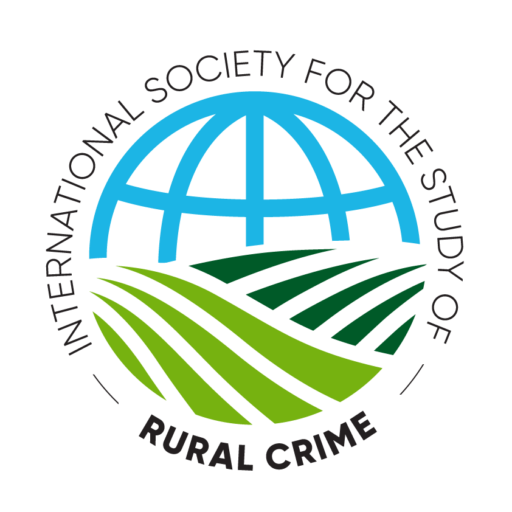ISSRC Blog
This blog provides an opportunity for pithy observations or reflections on topical rural crime news and developments, a summary of research, promotion of publications, advertisements for upcoming events… and more! If you would like to contribute, email a submission of no more than 500 words to admin@issrc.net
Australian rural crime fiction – Garry Disher’s novels
(post by Alistair Harkness)
For Christmas last year, I received three novels by Australian rural crime author Garry Disher – and cannot recommend them highly enough. Even for those of you in other places, they are all well-crafted and rollicking good reads in the rural noir. Disher has been quite a prolific writer across a number of genres and for multiple audiences, but I will focus briefly on the three Australian rural crime titles I have read this year.
Bitter Wash Road (2013) and Peace (2019)
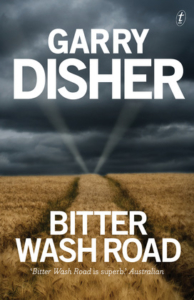 Bitter Wash Road (2013) is set in outback South Australia and centres on a Constable, recently demoted and sent to a single office police station in the fictional town of Tiverton. It is there that he must ingratiate himself with locals, deal with his police seniors whilst also keeping the peace and upholding the law. For a longer assessment, this book has been reviewed by The Guardian newspaper.
Bitter Wash Road (2013) is set in outback South Australia and centres on a Constable, recently demoted and sent to a single office police station in the fictional town of Tiverton. It is there that he must ingratiate himself with locals, deal with his police seniors whilst also keeping the peace and upholding the law. For a longer assessment, this book has been reviewed by The Guardian newspaper.
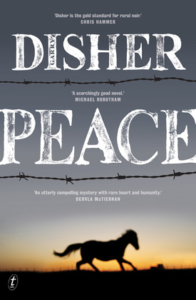 What has prompted this blog post is that a sequel – Peace (2019) – involving the same central character in the same locale, has just recently been published. With Christmas just a month away, I am dropping hints to my family – but I am not at all sure that I can wait that long to get a copy and sit down for a read!
What has prompted this blog post is that a sequel – Peace (2019) – involving the same central character in the same locale, has just recently been published. With Christmas just a month away, I am dropping hints to my family – but I am not at all sure that I can wait that long to get a copy and sit down for a read!
Under the Cold Bright Lights (2017)
 Under the Cold Bright Lights (2017) was particularly interesting for me, as it is a police procedural set on the Mornington Peninsula near to where I live and I was able to recognise many familiar (only subtly disguised) places throughout the novel. But this is by no means important to other readers – as with the other books, this one is gripping from start to finish. Whilst not strictly rural in its setting and focus – the characters slip from bustling Melbourne to the urban fringe and much less bustling parts of the Mornington Peninsula – the reader is led on quite an adventure. This book was reviewed by the Sydney Morning Herald.
Under the Cold Bright Lights (2017) was particularly interesting for me, as it is a police procedural set on the Mornington Peninsula near to where I live and I was able to recognise many familiar (only subtly disguised) places throughout the novel. But this is by no means important to other readers – as with the other books, this one is gripping from start to finish. Whilst not strictly rural in its setting and focus – the characters slip from bustling Melbourne to the urban fringe and much less bustling parts of the Mornington Peninsula – the reader is led on quite an adventure. This book was reviewed by the Sydney Morning Herald.
Signal Loss (2016)
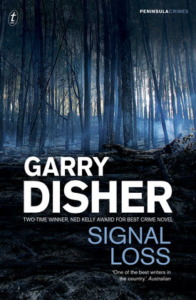 And lastly, Signal Loss (2016) is the most recent instalment in Disher’s Peninsula Crimes series (the Challis and Destry Novels). In this one, Inspector Hal Challis and Sergeant Ellen Destry are the lead characters, trying to identify bodies and on the hunt for a serial rapist.
And lastly, Signal Loss (2016) is the most recent instalment in Disher’s Peninsula Crimes series (the Challis and Destry Novels). In this one, Inspector Hal Challis and Sergeant Ellen Destry are the lead characters, trying to identify bodies and on the hunt for a serial rapist.
More on Garry Disher
The Sydney Morning Herald has recently published a profile piece on Garry Disher and you can read and listen to more at his publisher’s website. Copies of these novels are readily available, including from the Book Depository.
American Society of Criminology – a review of the 2019 annual meeting
The 2019 meeting of the American Society of Criminology – the 75th meeting – took place in San Francisco between 13 and 16 November. For those who have not attended a meeting previously, this is a big event. Almost 5000 people attend, and the conference program is 472 pages long.
Rural criminology continues to grow. A search of the program using the keyword “rural” resulted in 81 entries: a clear demonstration of how much rural criminology has indeed grown.
Some selected conference highlights
A number of themed panels were arranged, providing an opportunity for rural criminologists to share their research with one another, but importantly, too, to share with other colleagues from across the broader criminology field.
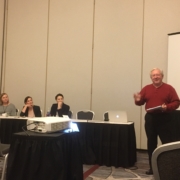
Joe Donnermeyer
A session on qualitative rural research, chaired by Rashi Shukla from the University of Central Oklahoma, contained presentations from Rash and her colleague Melissa Inglis from East Central University; Jessica Peterson from Indiana University; an Alison Cox from the University of Northern Iowa. Each presentation shed interesting light on the some of the challenges of rural field work research – filling the car with petrol, taking a cut lunch, being very organised and other practical considerations for example.
A roundtable on these challenges was also convened by our own ISSRC president Joe Donnermeyer with Rashi Shukla and another roundtable on the future of rural criminology led to an informal exchange of ideas which will no doubt lead to ongoing and productive collaborations.
Joe Donnermeyer also arranged a themed panel on farm crime victimisation, with presentations from Alistair Harkness (Federation University in Victoria, Australia), Vania Ceccato (Royal Institute of Technology, Sweden) and Matt Bowden and Artur Pytlarz (Dublin Institute of Technology, Ireland).
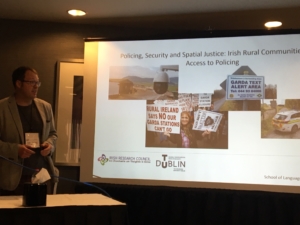
Artur Pytlarz
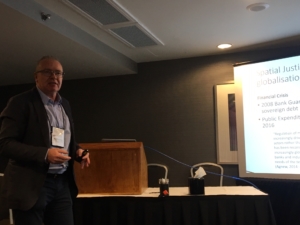
Matt Bowden

Vania Ceccato
Demonstrating the internationality of both the conference and contemporary research, a themed panel canvassed issue around rural crime in China and two sessions additional sessions addressed issues around rural access to justice.
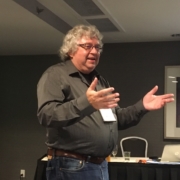
Ralph Weisheit
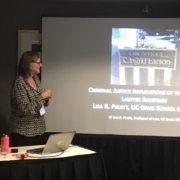
Lisa Pruitt
Two other roundtables – one on technology and rural criminology organised by ISSRC Treasurer Bridget Harris, Queensland University of Technology) and on rural crime prevention organised by ISSRC secretary Alistair Harkness) were other highlights and, again, led to scintillating discussions.
Of course, other rural related papers were dotted throughout the conference. To take but just one example, Tarah Hodgkinson (Griffith University), for instance, presented her research on perceptions of crime and safety in a small rural community in Saskatchewan in a panel with three other urban-focused papers centred on the theme of community perceptions of crime.
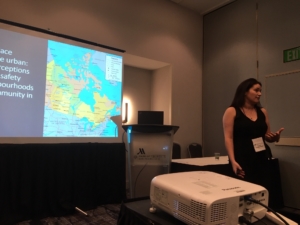
Tarah Hodgkinson
Of course, it is not just the formal aspects of as conference such as this which allow for sharing of research and perspective, but the “sidelines” discussions over coffee, drinks and meals also generate an enormous degree of good will and collaborative spirit which bodes extremely well for the months and years ahead.
The Division of Rural Criminology
The Division of Rural Criminology is now well established, and at its annual general meeting many of the Board members were introduced:
Chair: Joseph F. Donnermeyer
Vice-Chair: Walter DeKeseredy
Secretary-Treasurer: David May
Executive Counselors: Kyle Ward and Ralph Weisheit
Student Representative: Ashley Lockwood
A highlight, without doubt, was the awarding of the inaugural rural criminologist of the year plaque to Ralph Weisheit.
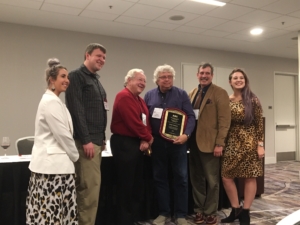
L-R: Danielle Stoneberg; Kyle Ward; Joe Donnermeyer; Ralph Weisheit; Walter DeKeseredy; Gabrielle Lory
More information on the Division, including its newsletters and membership details, can be found on the Division’s website.
ASC 2020
The 76th meeting of the ASC will be held in Washington DC between 18 and 21 November 2020. The theme is “Crime and justice theory and research: Thinking outside the box”. Much opportunity for rural criminologists to present their work and continue the expansion of rural crime scholarship into the future.
Launch of the Centre for Rural Criminology (UNE)
The official launch of the  Centre for Rural Criminology at the University of New England will be held on Monday 9 September 2019 from 5.30pm (for refreshments) to 7.30pm.
Centre for Rural Criminology at the University of New England will be held on Monday 9 September 2019 from 5.30pm (for refreshments) to 7.30pm.
Organised by ISSRC’s Vice President Dr Kyle Mulrooney, who is also a Co-Director of the Centre, the launch will be held at the Armidale Town Hall in New South Wales, Australia. It will feature two other ISSRC executive members, Dr Bridget Harris and Dr Alistair Harkness, as well as Deputy Commissioner Gary Worboys of the New South Wales Police Force.
For more information and to register to attend, visit this Eventbrite page.
Information on the Centre, its members, research projects and more can be found at the Centre’s official website.
